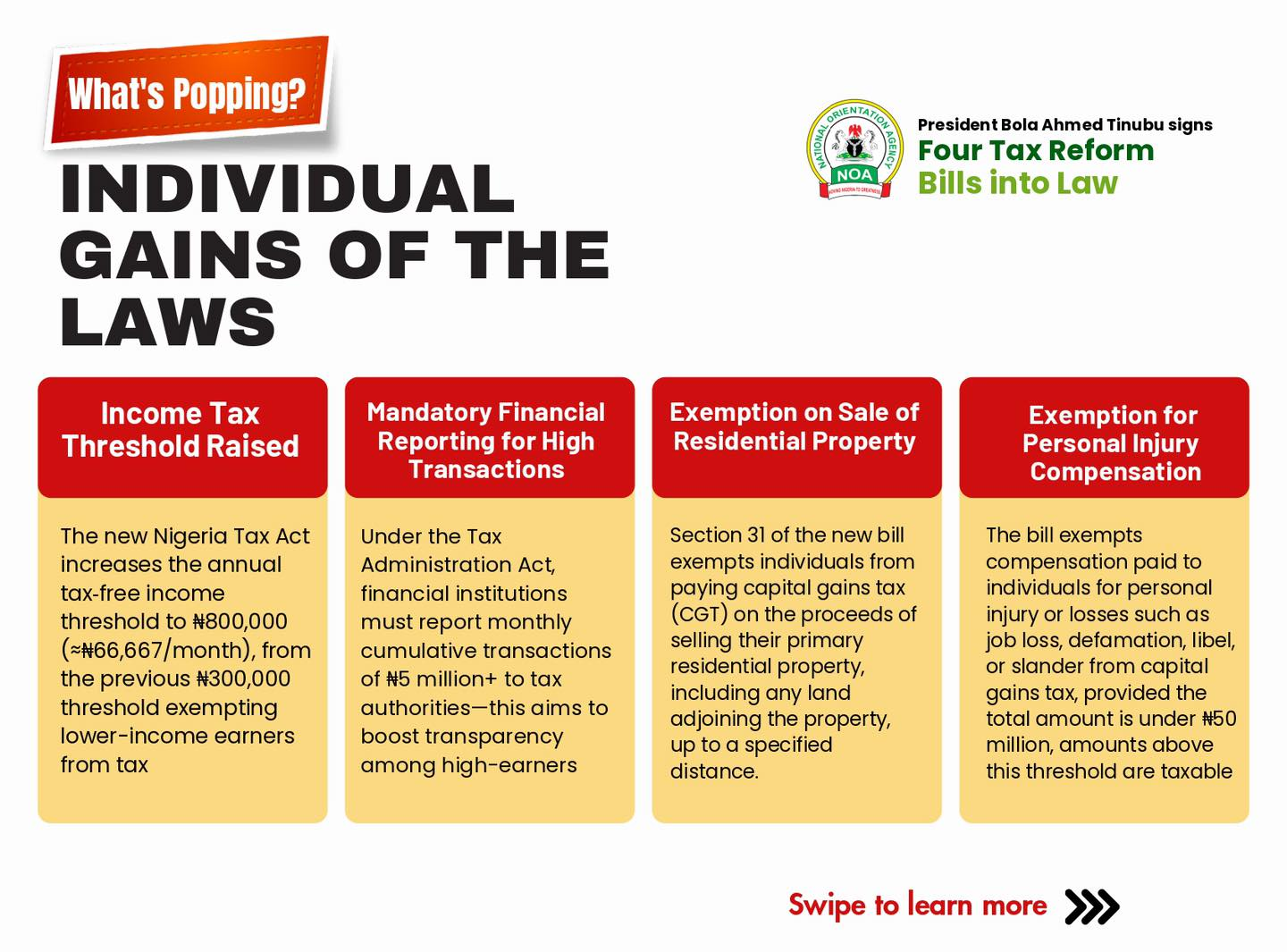Nigeria’s 2026 Tax Reform: What It Means for the Fintech Sector

Nigeria’s tax reform is about to shake things up. Set for January 1, 2026, this overhaul is one of the biggest moves the country’s made on taxes in decades. Lawmakers have bundled together a bunch of old tax rules, tossed in some new ones, and wrapped it all up in a package they say will make taxes simpler, more digital, and a lot broader.

If you’re in fintech, this hits close to home. The industry’s been booming, everywhere you look, there’s another startup making waves. For years, many of them grew fast in a kind of wild west, with rules that left plenty of wiggle room. That’s changing. The new laws push everyone toward more formal, accountable ways of doing business.
One of the biggest changes? There’s a new “Development Levy,” a flat four percent on profits. It replaces a whole tangle of old taxes, IT levies, random sector fees, you name it. On top of that, the government’s rolling out the Nigeria Revenue Service, which takes the place of the old Federal Inland Revenue Service. This new agency gets a major upgrade: digital monitoring, automated invoicing, and tax reporting in real time.
For fintechs, this means the government’s watching digital transactions more closely. Companies have to verify tax IDs, follow stricter reporting rules, and keep better records. Startups that used to slip under the radar, or work across borders without much oversight, now know exactly what’s expected when it comes to taxes.
Not all the news is tough, though. The reforms give smaller businesses a break. If your annual turnover is under 100 million naira, you’re off the hook for company income tax, capital gains tax, and the new levy. That gives new fintechs some breathing room to figure things out before dealing with heavier tax bills.
Crypto’s getting pulled into the spotlight too. Exchanges, blockchain firms, and anyone handling virtual assets are now officially taxable. That means profits from crypto trading or digital wallets can’t hide in a legal grey area anymore.

In the end, the 2026 reform sets the tone for a more disciplined, more transparent digital economy in Nigeria. For fintech firms, it’s both a challenge and a chance, a push to tighten up operations, get serious about tax compliance, and build for a future where the rules are a lot clearer.
Fintech Operations, Challenges, and Emerging Opportunities
Fintech in Nigeria isn’t just booming, it’s become a multibillion-naira industry, touching everything from payments and credit to digital banking, savings, lending, and remittances. But, let’s be honest, the rules haven’t exactly kept up. Now, with the 2026 tax reform coming in, the government wants to catch up and tighten things up on the fiscal side.
Right out of the gate, fintechs are going to run into compliance costs. There’s new stuff like e-invoicing, unified tax IDs, and mandatory VAT reports. That means buying new software, hiring accountants who actually get these rules, maybe even bringing in someone just to deal with regulators. Lean startups? They’ll have to step up their back-end game.
Then there’s the whole digital assets and cross-border tax issue. Nigeria’s huge for crypto, tons of activity, but most of it flies under the tax radar. The new rules change that. Now, platforms and users have to declare their crypto profits and pay up. Sure, that adds more hoops to jump through, but it also gives the industry a shot at real legitimacy and could pull in more investors who want transparency.
It’s not all pain, though. The reforms carve out space for smaller fintechs—they can stay tax-free while they’re under the threshold, which gives them breathing room to grow and attract investors. On top of that, companies that put money into things like payment systems, cybersecurity, or local data centers can grab tax credits. That’s more incentive to build real infrastructure in Nigeria, not just outside it.
Honestly, maybe the biggest upside is that fintechs can help drive the reform itself. The government wants to digitize tax collection, and who’s better positioned than fintechs processing payments or handling big piles of user data? They can jump in with tech for tracking, verifying, or automating taxes. This could totally change how government and private companies work together.
The reforms also push fintechs to localize. If your servers and data centers are in Nigeria—and you’re registered for taxes here—it’s a lot easier to follow the rules and earn people’s trust. Over time, this could grow into a more solid and transparent ecosystem, less hooked on offshore setups and more tied into Nigeria’s real economy.
Sure, there are risks. Some fintechs might feel the tax pinch, and there’s always the headache of more paperwork. But at the end of the day, the fintechs that lean into transparency, smarter digital systems, and long-term planning will come out ahead.
Strategic Response and What Comes Next
For Nigeria’s fintech companies, the next year isn’t just another stretch, it’s a turning point. The sharp ones won’t see the new reforms as a headache. Instead, they’ll use them as a guide to grow up and get serious.

First things first, they need to dig into a real tax impact assessment. That means taking a hard look at how their revenue streams, international deals, and transaction numbers fit into this new setup. Get a handle on the thresholds and exemptions, doing this helps them structure things smartly and dodge nasty surprises down the road.
Next up, it’s time to put money into compliance tools. We’re talking automated accounting, e-invoicing, and tech that links every transaction straight to a tax ID. The ones who get this sorted early won’t panic when audits or digital checks roll around.
On the other hand, fintech bosses cannot afford to sit around-they should engage directly with policymakers. Bringing their on-the-ground experience to the table, they can help shape rules that actually work in the real world. Such collaboration might even pave the way for joint digital tax projects involving both the government and private players.
Another big thing: rethinking pricing and business models. If new taxes drive up costs, these platforms have to make a call—eat the costs or pass them to users. Either way, being upfront with customers is key, especially in sensitive areas like payments and loans. Trust takes a hit if you just spring changes on people.
One more move that matters: invest at home. The fintechs will tick the data sovereignty box, stay in the good books of regulators, and earn real local credibility by keeping their data and operations inside the borders.
So, what is really on the line with Nigeria's 2026 tax reform? It’s a big test, sure, but also a chance to step up. Fintechs, once known for moving fast and breaking things, now have to show they can play by the rules, and win. The early movers get to set the pace for digital finance in Africa. The laggards? They’ll watch from the sidelines as the informal economy fades and a more organized, data-driven system takes over.
You may also like...
Workplace Loneliness: How Remote Work Changed Human Connection

Remote work promised freedom but created a new loneliness. Africa’s work culture is losing its sense of connection, do ...
What Is Really Tech? Rethinking Africa’s Everyday Innovation Culture

What does “tech” really mean in Africa? Innovation has to be seen beyond apps and startups, grassroots mechanics and...
P2P Crypto in the Informal Economy: The Unseen Payments Revolution

Peer-to-peer crypto trading is transforming the global informal economy from Africa to Asia as millions bypass banks to ...
Celtic Outrage: Legend Blasts Iheanacho Acquisition, Calls It a 'Mistake'
)
Celtic legend Peter Grant has publicly criticized the club's decision to sign Kelechi Iheanacho, arguing that local tale...
Mbappe's Bold Take: Star Forward Weighs In On Real Madrid vs. PSG & Ronaldo Comparisons
)
Kylian Mbappe has addressed comparisons to Cristiano Ronaldo, acknowledging the legend's unmatchable legacy while assert...
Emotional Echoes: Chloe Zhao and Kore-eda Hirokazu Move Each Other to Tears at Tokyo Festival

Filmmakers Chloe Zhao and Kore-eda Hirokazu shared a deeply personal conversation at the Tokyo International Film Festiv...
Trump Unleashes Praise: President Approves Skydance's Paramount Acquisition and Bari Weiss at CBS News

Donald Trump’s recent 90-minute interview with “60 Minutes” covered a vast array of topics, including his approval of Sk...
West Africa's Literacy Surge: Liberia Champions Education Solutions at Pan-African Summit

Liberia Reads! Association of Literacy Educators (LR!ALE) made a significant impact at the 14th Pan African Literacy for...




